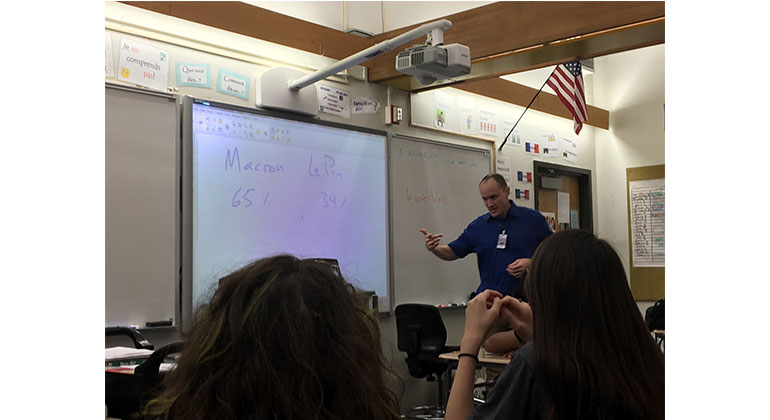French Students Learn About Politics Through Election

In times of international concern, it can often be intimidating for people to educate themselves about the issues that are occurring around the world. The events that take place in different places can, many times, be daunting to look at, especially if they require understanding the complexity of another country’s political system. During the recent French presidential election, French students had the opportunity to get to know the political climate, as well as get an understanding of the candidates that France’s different parties had to offer by studying it during class.
“I think that it is important for my French students to know what is going on in the French speaking world and for people to know about one of the most important European elections in the past fifty years. [This election] has an impact on the future of the European Union as well as ultra right Nationalism,” French teacher David Morey said. “I think [such radical ideas] are a dangerous trend, and I think that it is irresponsible and naive to view them as something that is passing. The more [these ideas] are normalized the more dangerous our world will become.”
Morey, who was able to teach his students about the election through interviews and ad campaigns of the two primary candidates, Emmanuel Macron and Marine Le Pen, wanted to show his students the importance of looking at international issues in order to get them to think about the impact that different nations have on the world as a whole.
“I think too often people in the United States only turn their eyes inward. It is important to learn about what is happening around the world. As more time goes on, the more of an impact [these issues] have on our lives and our world,” Morey also said.
For some French students, the introduction of the French election was the first time they had been introduced to French politics, as well as the political structure of France.
“[Before we learned about this topic], I was not even sure if France had a president. I knew [the French people] voted, but I wasn’t sure of what they called their political leader. I found it interesting to learn about the differences between United States and French elections,” said junior Lucy Garlich.
The French election, which consists of different rounds in which some candidates are eliminated from the race, is directly correlated with the popular vote of the French people. Introduction to these topics has allowed French students to reflect on the differences between the political structure of the United States and France and make their own opinions of these systems.
“I like how [the French election] doesn’t have an electoral college. I think each person’s vote matters in an election, and I feel like the electoral college [in the United States] doesn’t accurately represent what the people voted for,” Garlich also said.
Since being introduced to the election, French students have been able to decide for themselves which candidates they would feel more confident with running France and have been able to express their feelings of the results of Emmanuel Macron’s victory.
“I feel like it was a great choice for [the French] to elect Macron, and I think he will make France a better place. He has great ideas for France and will have a great influence on their country,” said sophomore Jada Allen.
by Kyle Wolfe, Side Dish Czar